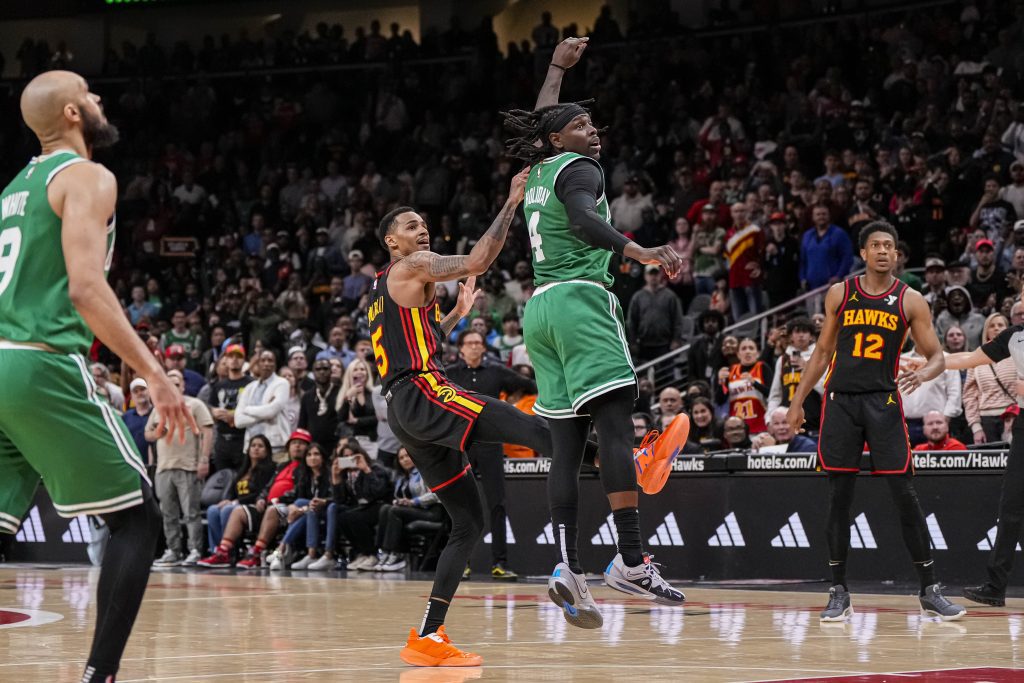ATLANTA — Jayson Tatum lined up in a familiar position, standing in the back court the way he did to force overtime against the Cavaliers and beat the 76ers one year ago. He ran downhill with seven seconds left in regulation, receiving the ball from Jrue Holiday and meeting Wes Matthews and Bogdan Bogdanovic. They forced him left into a fadeaway three that had no chance. A familiar result.
“Found an opening, Jrue came and brought his man in the action and they switched,” Tatum said. “There was only six seconds left, just trying to get a clean look, hold it for the last shot, make sure they didn’t get an opportunity to get the ball. Five seconds, I caught it at half court, in hindsight, you can always go back and see a lot of things you could’ve done differently. Especially when you lose. I know I’ve missed a couple (last-second shots) this year, so I’m like damn. I’ve gotta be due for one. I hit a bunch of them in my career so far, but it’s part of it. Make-or-miss league, but I do enjoy being in those situations.”
The Celtics lost, 123-122, in overtime and fell to 4-8 in games played within one point in the final minute and 2-7 in one-point games during the final 10 seconds. A conflicted result following an extra period that ended with Boston shaking up its last shot approaching, playing through Kristaps Porzingis in the post, who got Jaylen Brown the ball at the elbow for a potential game-winning shot that he buried. Dejounte Murray matched it, trailing by one, with a mid-range dagger over Holiday draped all over him with 0.1 left on the clock that secured back-to-back Hawks wins over Boston in the rare week-long mini series. One of many lessons the Celtics will need to pull from the losses.
Boston also lost on Monday after squandering a 30-point lead with all the obvious caveats, playing without Holiday or Derrick White, following a nine game win streak and capped by De’Andre Hunter sinking a three he shouldn’t have taken to secure the win. On Thursday, Holiday’s return from a five-game absence reunited Boston’s dominant starting lineup for the first time in three weeks, the Celtics had two days off and got the chance to practice following more crunch time issues in the previous loss. Running out the clock on regulation, a common occurrence for Boston, allowed for another chance that the Celtics took advantage of and could build on. Joe Mazzulla spoke light-heartedly after and explained ways that Boston experimented in the loss, including switching Porzingis one-through-five to guard Murray in overtime.
“We had four different options (to end overtime),” Tatum said. “D.White threw it to K.P. We just knew, whoever got it, we wanted to go quick. As soon as K.P. caught it, I just ran down, I thought he was about to shoot it, so I could try to get the offensive rebound. J.B. made a big shot. Joe drew up a play, we had 4-5 different options and K.P. happened to be the first one.”
Mazzulla called the difference in approach between the end of the fourth and overtime a product of time-and-score, with more urgency while trailing by one point compared to the tie game Tatum tried to break five minutes before Brown’s shot. The shift away from Tatum, who’s now shooting 2-for-8 in the final minute of one-point games and 1-for-6 in the final 10 seconds, still appeared notable beyond its success. The Celtics had almost made a Tatum jump shot the default for a team playing more unevenly in late game situations than even one year ago. Brown received a chance on Monday, trailing by one, and launched a fadeaway three with the shot clock expiring. So it’s not just a Tatum problem. That Tatum received the ball every time compounded the issue, making the Celtics’ late game plays more predictable. Especially when Boston slowed down without calling a timeout.
That Mazzulla could draw up a pair of plays on Monday helped. Draining most of the 27 seconds in a tie game made some sense, but Tatum banged away at Matthews 30 feet from the basket, seemingly without a plan for if Matthews didn’t foul. Matthews gave one with seven seconds left, a chance for Tatum to break into the half court into a play he’s succeeded in before. This time, a pass to his right as Matthews scrambled back to catch Holiday might’ve made sense. The priority for the Celtics, in that situation, remains getting a shot off, not turning it over and leaving the opponent with no chance to take a shot in the other direction. That’s put Boston in six overtimes this season, where they’ve lost four.
Mazzulla said those late-game results mostly come down to making and missing shots, but added that getting to the free throw line and playing through physicality also contributes to the success and failure of teams in those spots. A subtle note at how Boston can improve at one of its few weaknesses, and the one most likely to play a part in whether or not the team wins a championship this postseason.
“Not settling sometimes,” Brown said. “I think sometimes we’ve settled, or whatever, and we can get to the basket. I think we’ll be ready when it’s time, we’ve just gotta make sure we execute, we got our spacing and we are not settling or leaving it to the officiating. You get to your spot, go up-and-down and live with the results.”

